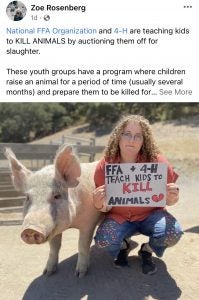Several anti-animal-agriculture and vegan activists are speaking out against philanthropist MacKenzie Scott’s $50 million donation to the National 4-H Council, claiming that 4-H is too closely connected to sectors that promote greenhouse gas emissions. Those claims center around livestock production and the show animals that are involved in 4-H. The activists, who are as young as 11 years old, are uniting behind a coalition called Youth Climate Save.
4-H programs operate in both urban and rural areas around the nation, helping to nurture fields such as science, arts, and agriculture, as well as teach responsibility and leadership. It is America’s largest youth development organization and works to build community youth through well-rounded educational programing. The gift from Scott, an award-winning author and former wife of Amazon founder Jeff Bezos, has been called “transformational” by the National 4-H Council.
“Amid the serious challenges affecting our youth — from a national mental health crisis to widening opportunity gaps — the skills, confidence, and resilience young people develop through 4-H programs are essential,” the Council said in a statement announcing the gift.
Yet this isn’t the first time that animal-rights activists have gone after 4-H members and the organization itself. There have been broad and sustained aggression in recent years toward these agricultural youth organizations, on a broad level and through more personalized targeting. In one example, Victoria Banks was 14 years old when her Facebook page about raising and showing pigs in 4-H was suddenly disrupted with an onslaught of negative reactions, harassing comments, and interactions she and her mother could only describe as “aggressive, demeaning, vulgar, hateful and disgusting.”

In its rebuttal to Scott’s donation, the Youth Climate Save coalition has tried to claim that it is motivated by climate concerns and that livestock’s impact on greenhouse gas emissions is too big to ignore. It asks that Scott explicitly exclude her donation from being used for the raising and selling of farmed animals or any other program that involves “animal exploitation.”
While the agricultural industry as a whole contributes to 9 percent of U.S. emissions, livestock production is barely a third of that — far below other sectors such as transportation and electricity. And the cattle industry, in particular, has shown marked improvements in emissions in recent decades, with more production in both beef and dairy being done with fewer animals and with more efficient management techniques.
It’s clear that the activists’ message in fact revolves around promoting veganism more so than climate responsibility.
“I have seen countless posts on social media of children with tears in their eyes as they prepare to sell the animal they raised since birth. You can see the look of sadness because they know deep down inside they are betraying the animals who trusted them,” said 15-year-old Genesis Butler, founder of Youth Climate Save. “These children are taught that the monetary value of the animal is more important than the life of a sentient being. My generation wants to live in a more compassionate world and we will never achieve this if children are taught to put their compassion aside for money.”
But those involved in programs such as 4-H and FFA see it vastly differently. One writer in an article titled, Being emotional about selling livestock is OK, states, “We know that the tears we shed are not brought on just by sadness. Yes, we feel sad to part ways with our animals, but we also feel content with months of memories and lessons, proud of our contribution to the livestock industry, and most of all, we know that we have grown through the experience.”
Yet the drumbeat from the activists is the same. Among those in the Youth Climate Save coalition is Zoe Rosenberg, founder of Happy Hen Animal Sanctuary in California. She is also affiliated with Direct Action Everywhere, or DxE as they call themselves, whose idea of activism often involves “open rescues,” which essentially means storming a farm and stealing livestock. She has a long history of fighting with the National FFA Organization and National 4-H Council over animal agriculture.

“I implore you to think about the consequences of teaching children to turn their backs on the animals they so dearly love and have raised and have bonded with,” she said in a statement related to Scott’s donation. “What kind of message does that send about the treatment of those you love?”
Those who do not come from an agricultural backgrounds may not understand how youth organizations view livestock. Yet raising livestock for food production is a major way in which the world is fed and a key source of nutrition to some of America’s most impoverished and food insecure regions. Teaching our young people about this part of the industry at an early age is teaching them to hold animals in high regard and have a valued respect for what they provide — even well beyond food.
4‑H’s reach and depth is unmatched, connecting with kids in every corner of America — from urban neighborhoods to suburban schoolyards to rural farming communities. The organization works through partnerships with schools where 4-H educators and agents from local Extension offices visit schools to teach lessons and meet with teachers to develop ideas for reinforcing topics and ideas that would otherwise not be taught to the students. Their network of 500,000 volunteers and 3,500 4‑H professionals provides caring and supportive mentoring to all 6 million 4‑H’ers.
Scott’s donation will do well to serve the next generation of agriculturalists.


